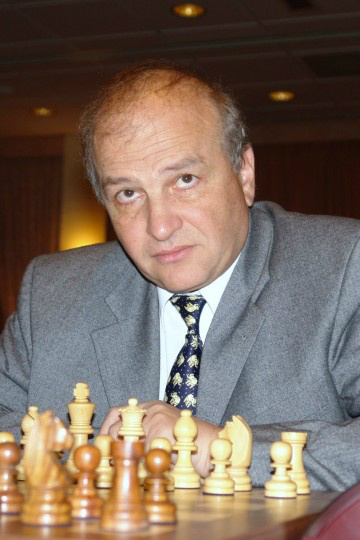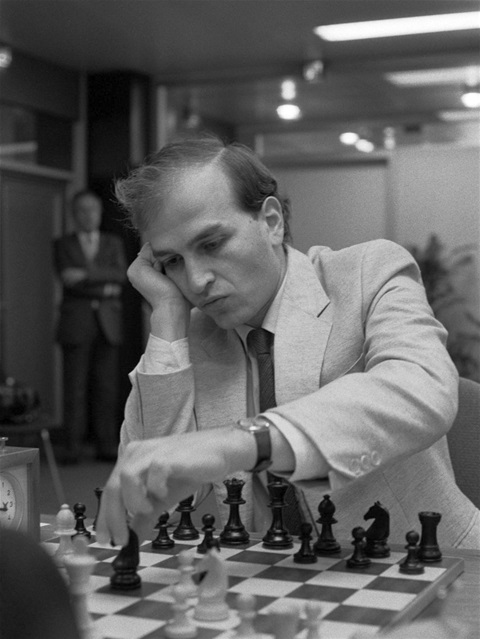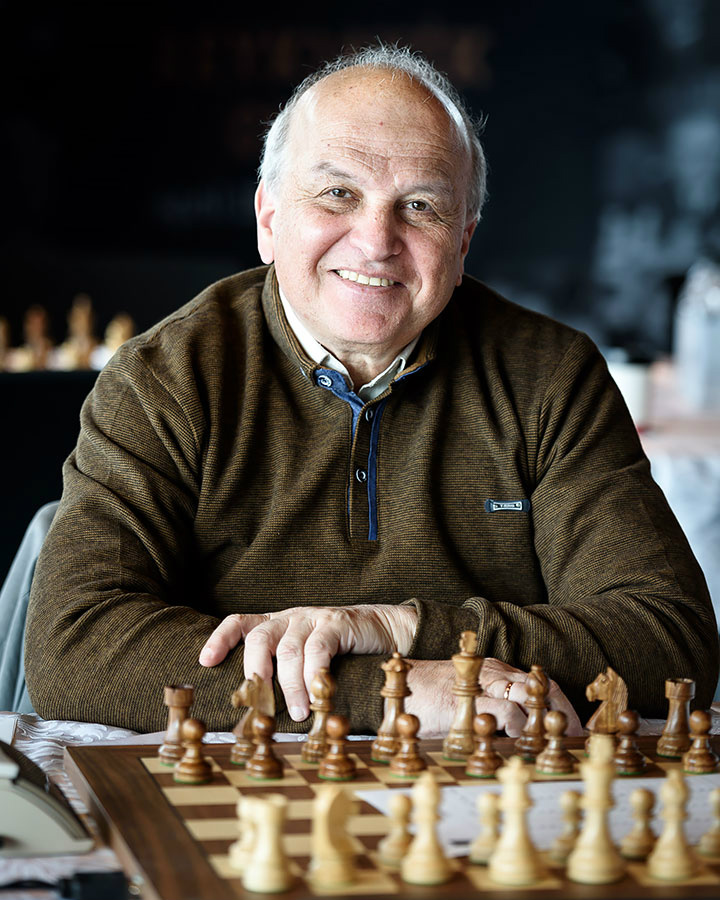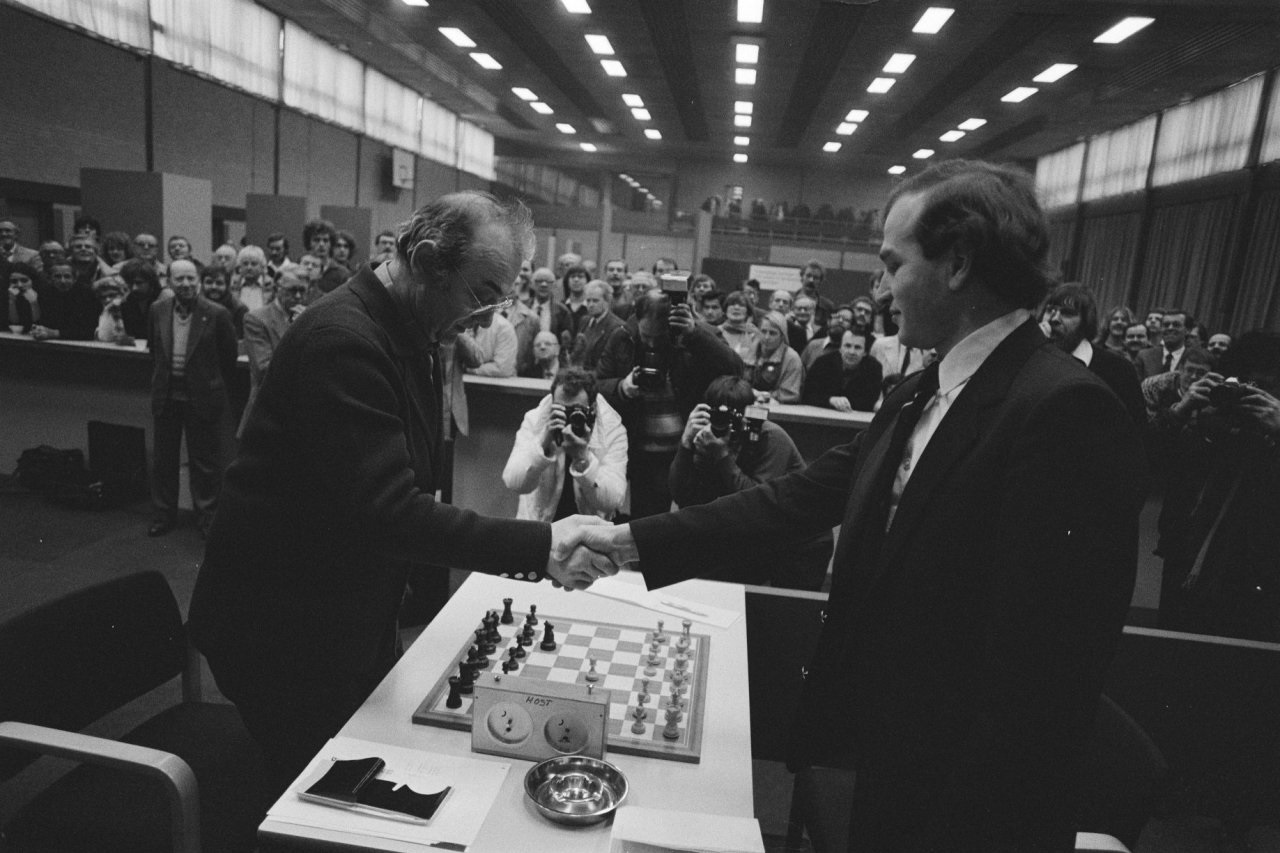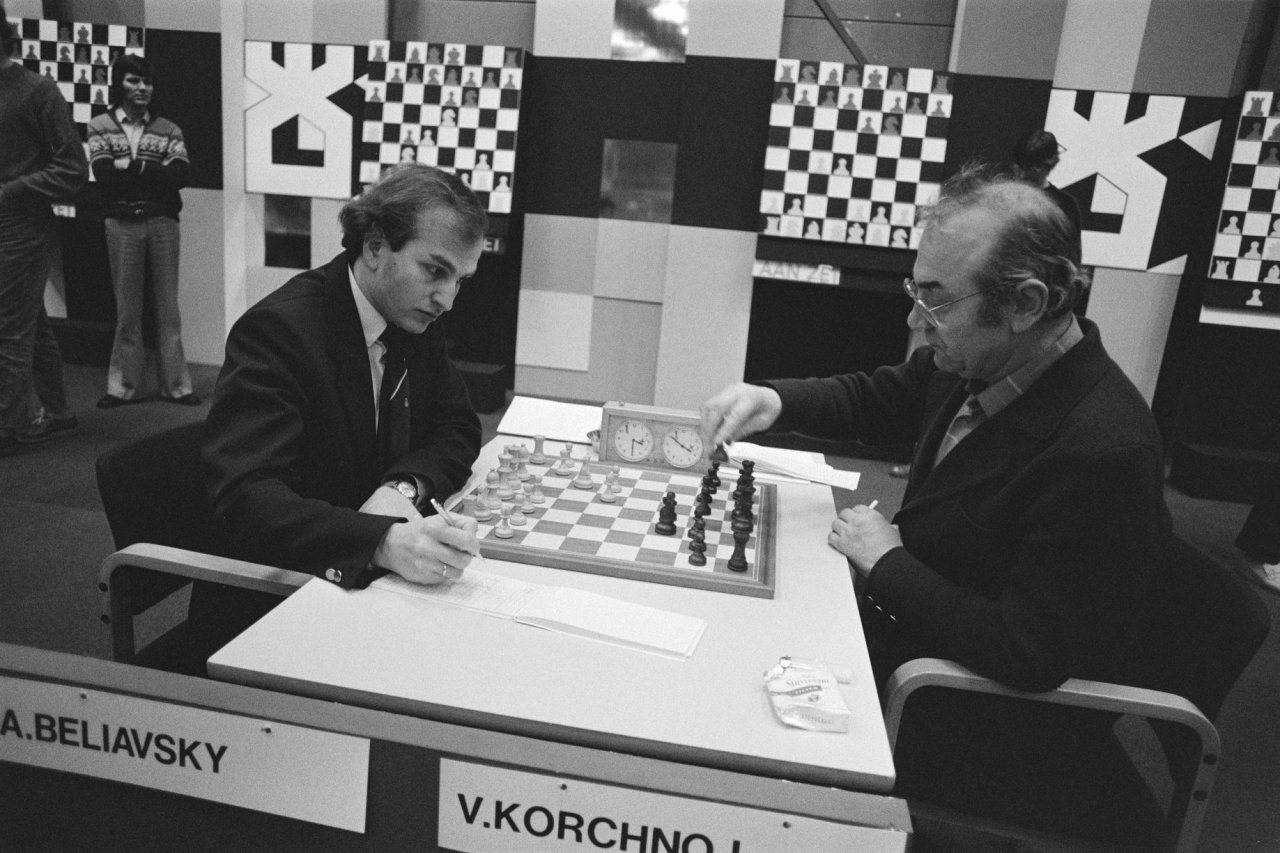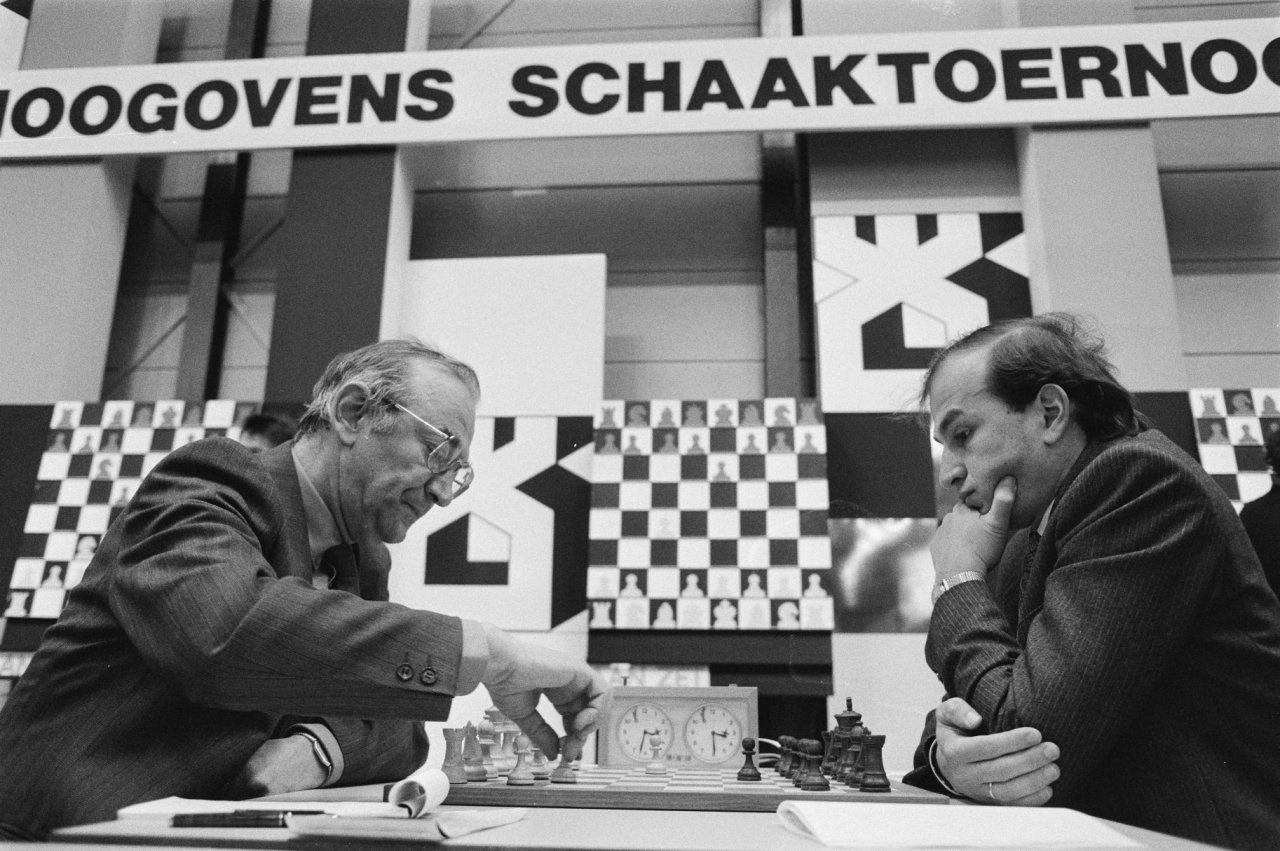Alexander Beliavsky or the shadow of the K's
In beating nine undisputed World Chess Champions in classical games, Alexander Beliavsky and Viktor Korchnoi are catching up Paul Keres (with Korchnoi having the highest number of classical game wins against future, reigning or past World Chess Champions).
Alexander Beliavsky has a most impressive record! His career in the 1980s and 1990s has been somehow overshadowed by the then dominance of Kasparov and reputation of the other K's (Korchnoi, Karpov, Kramnik, and historically Keres who met and beat young Beliavsky at the phenomenal strong USSR-ch41 in 1973). As Korchnoi, Alexander Beliavsky is always a fierce fighter with a profound dislike for grandmaster draws. Let us honour him with a substantial biography of his achievements.
Profile
Alexander Genrikhovich Beliavsky (sometimes transliterated as Belyavsky; born December 17, 1953 in Lviv) is a Soviet, Ukrainian and Slovenian chess grandmaster. Today, he is citizen of and lives in Slovenia.
IM since 1973. GM since 1975. Beliavsky is also a chess coach of note and in 2004 awarded the FIDE Senior Trainer. He was a regular top ten player throughout the 1980s and occasionally in the 1990s, belonging
to the world's top five in the mid and late 1980s. His career records had been overshadowed by the supremacy of Garry Kasparov.
Champion: Beliavsky was World Junior Chess Champion
in 1973. He won the USSR Chess Championships four times: in 1974 (with Mikhail Tal), 1980 (with Lev Psakhis), 1987 (defeating Valery Salov in a play-off) and 1990 (as first on tie-break with Leonid Yudasin, Evgeny
Bareev and Alexey Vyzmanavin, there was no play-off). Beliavsky is also Slovenian champion (claiming this title first in 1996, and again in later years).
Notable Tournament wins:
Beliavsky won at Tilburg in 1981 (clear first ahead of Petrosian, Timman, Portisch, Ljubojevic, Spassky, Kasparov with 50%, Andersson, Larsen, Sosonko, Hübner, Miles), and enjoyed again a triumph at Tilburg in
1986 (clear first ahead of Ljubojevic, Karpov, Miles, Timman, Portisch, Hübner, Korchnoi). Alexander Beliavsky was sole winner at the two strong and last OHRA-Amsterdam tournaments in 1989 and 1990, and was joint winner with
Viktor Korchnoi at the traditional Wijk aan Zee in 1984.
Alexander Beliavsky won also among others the Invitational tournaments at Kiev International in 1978, Alicante in 1978 (making it clean 100%,
a rare perfect score of 13/13, full five points above shared second Mark Diesen and Evgenij Ermenkov), Frunze International in 1979,
Bogota in 1979 (two points ahead of James Tarjan), Tashkent in 1980 (USSR ch semi-final), Bucharest in 1980 (three points ahead of Mihai Suba), at Baden (by Vienna) in 1980
(with Spassky), at Bosna, Sarajevo in 1982 (scoring stunning 12.5 out of 15 points in a pretty strong field), the Chigorin Memorial in Sochi in 1986 (equal with Svetozar Gligorić and Rafael Vaganian, edging out Tal, Smyslov,
Geller, Razuvaev, among others), Akker Brygge (Norway) in 1989 (Mini tournament, clear first ahead of Tal, Smylsov, and Simen Agdestein), Munich (Mephisto-SKA) 1990, Belgrade (Investbanka) 1993
(featuring Kramnik, Khalifman and Bareev; Beliavsky is clear first, 1.5 points ahead of top-seed Kramnik), León 1994, Cacak 1996, the Rubinstein Memorial in Polanica-Zdrój in 1996, a record
five times the Vidmar Memorial: 1999, 2001, 2003 (joint with Emil Sutovsky) and 2005 held at Portorož, as well as 2011 at Ljubljana (Vidmar Memorial as the
national Slovenian Championship), Ljubljana 2002 (Metalka Trgovina, 90th anniversary of the chess club of Ljubljana, established in 1912 by scientist and later inaugural chess grandmaster dr. Milan Vidmar and by
the City of Ljubljana), and the Gotth' Art Cup at Szentgotthard (Hungary) in 2010, ahead of 2nd/3rd Portisch & Rapport. Beliavsky’s first victory abroad was the 5th Parcetic Memorial
at Sombor (Yugoslavia, now Serbia) in 1972 (as clear first ahead of Csom, Timman, Matulovic, Velimirovic, Adorjan, Knaak, Jansa and others).
Alexander Beliavsky was co-winner with Korchnoi (first on
tie-break scoring) in the IBM-Vienna Invitational Open in 1986, including four top-ten players, ahead of luminaries as Karpov, Spassky, Nunn, and young Zsuzsa Polgar. He won several other forceful Open Festivals (swiss system),
eg. as clear first the famous Lloyds Bank Open, London in 1985, as clear first the 17th Bled Open in 1996, or the traditional Politiken-Cup at Chess Festival Copenhagen in 2002, together with Sergej
Tiviakov (first on tie-break scoring) and Ruben Felgaer.
Beliavsky was also awarded the winner’s trophy on better tie-break over (the first Uruguayan grandmaster) Andres Rodriguez Vila at the 1st Torneo Libertador Simón
Bolívar (Venezuala) in 2012 with 651 participants, and took clear first place at the 20th HIT Open Nova Gorica (Slovenia) in
2015.
Runner-up: Beliavsky was clear second to Garry Kasparov at Reykjavik (GMA World Cup Series) in 1988, clear second to Jan Timman at Linares in 1988, clear second to Maxime
Vachier-Lagrave in the Marx György Memorial at Paks (Hungary) in 2008, shared second at Las Palmas in 1974, shared second at Tilburg in 1984, shared second at Wijk aan Zee in 1985 (surprisingly Beliavsky could participate at this traditional tournament
just twice), shared second at Reggio Emilia in 1987/88, among other events.
Official FIDE events: As 2nd behind Garry Kasparov in the Interzonal at Moscow in 1982, Beliavsky qualified for the
Candidates of the best eight, losing to eventual winner and world champion Garry Kasparov in the quarterfinals of the 1983 Candidates matches. He also came 2nd at the Tunis Interzonal in 1985, this time behind Artur Jussupow and qualified for the then
following Candidates tournament in 1985 at Montpellier: Beliavsky did moderate as 6-7th, shared with Spassky, and subsequently missed a spot of the best four to advance. In the next Candidates cycle, he missed a qualification narrowly, coming in as clear fifth
in the Interzonal at Szirak in 1987. Beliavsky did not take part in the two last ever Interzonals at Manila in 1990 and at Biel in 1993. He won the Pula Zonal 2000.
In 2013 Beliavsky tied for 1st–8th as 4th (with Alexander Moiseenko, Evgeny
Romanov, Hrant Melkumyan, Constantin Lupulescu, Francisco Vallejo Pons, Sergei Movsesian, Ian Nepomniachtchi, Alexey Dreev and Evgeny Alekseev) in the European Individual Chess Championship, subsequently qualifying for the FIDE Chess World Cup 2013,
where he lost to Chinese GM Yangyi Yu in the tiebreaker of the first round match.
As mentioned, Alexander Beliavsky won the Junior World Championship at Teesside (England) in 1973 ahead of Anthony Miles and Michael
Stean.
Team events: At the second USSR vs. Rest of the World match, London in 1984, Beliavsky was the ultimate top scorer for the soviet team, defeating
Yasser Seirawan 2–0 and Bent Larsen 1½–½. Thanks to his tellar 3.5 to 0.5 board win, the USSR won the overall match against the Rest of the World (21-19).
Beliavsky scored a superb 8/10 at the first board of
the Olympic team in Thessaloniki 1984, winning an individual bronze medal on top board (behind minor players who faced much weaker opposition) and achieving the (joint) second best individual performance of all participants.
He was four
times member of the gold medal winning USSR team at the Chess Olympiad in 1982, 1984, 1988, and 1990 (in the year 1986, despite winning at Tilburg, Beliavsky was finally not selected by his own Federation meanwhile much lower rated Vitaly Tseshkovsky
got a spot as then reigning USSR champion), playing for the Ukrainian team in 1992, and since 1996 for Slovenia, leading their team from 1996 to 2014 on board one.
In the first two editions of the World Men’s Team Chess Championship
at Lucerne in 1985 and 1989 respectively, Beliavsky twice won the individual board and team gold medal for the Soviet Union. He also was member of the winning USSR team at the European Men’s Team Chess Championship in 1983 and 1989, playing
then in 1992 for Ukraine and afterwards biannually from 1997 to 2011, and again in 2015 and in 2017 for Slovenia.
In the Youth vs. Experience team match, Amsterdam in 2006 (organized by NH Hotels in close cooperation
with the Association Max Euwe of Dutch chess maecenas Joop van Oosterom), Alexander Beliavsky achieved together with rising prodigy Magnus Carlsen the best individual result (Scheveningen system), ahead of Karjakin, Wang, Hao, Smeets, and
Stellwagen, with the other four veterans Ljubojevic, Andersson, Jussupow, and Nunn below 50%.
Highest World ranking / best ELO rating: Entering the ELO Top 100 in 1975, Beliavsky has been a regular
top ten player in the 1980s and an occasional top ten player throughout the 1990s, with a peak ranking as no. 3= in (July) 1985, being clear no. 4 of the world in (January and July) 1988, achieving his peak rating of 2710 ELO in 1997. He has a tendency to be somewhat erratic. In January 1996, his ELO rating temporarily dipped to 2615. A sign of Beliavsky’s resilience is that he was able to work his way
back up to 2710 in the July list 1997, achieving thus his highest rating figure. Beliavsky might have been World Chess Champion Challenger himself if the two all-time superstars Karpov and Kasparov did not exist. Beliavsky’s last FIDE Top 100 ranking
(as no. 100/101) is dated from December 2013, aged 60. As of 2015, Alexander Beliavsky was by far the strongest < active > chess player of the world, aged 60 years plus, still with an ELO above 2600.
Style: “Big Al” is noted for his powerful and creative style of play, combined with classical opening repertoire, including openings such as the Queen's Gambit,
Ruy Lopez, French Defence or the Two Knights Defence. Beliavsky does not play quick games, he is an awesome attacker with much piece mobility and tempo, a fierce fighter who performs until the end with a profound dislike for grandmaster draws. More than once
his maximalist aspirations have led him to throw away a first-place finish rather than coast to victory with a quick draw. In 1998, he published “Uncompromising Chess”, which refer to what chess means to him.
Games:
Beliavsky vs. Kasparov 1-0, Candidate's qf, Moscow 1983:
http://www.chessgames.com/perl/chessgame?gid=1070062
Beliavsky vs. Larsen 1-0, Tilburg tournament, rd 6, 1981:
http://www.chessgames.com/perl/chessgame?gid=1257904
Karpov vs. Beliavsky 0-1, Tilburg tournament, rd 11, 1981:
http://www.chessgames.com/perl/chessgame?gid=1068510
Author: Alexander Beliavsky is a prolific and successful writer, especially about modern endgame theory and technique, often collaborating with Adrian Mikhalchishin. As a first-class endgame study composer, Beliavsky won also many first prizes in composition tournaments and is a noteworthy chess coach and senior trainer, also working as a trainer / second of French GM Maxime Vachier-Lagrave who placed himself in 2014 for the first time in the ELO top ten, and in 2016 in the top five of the world. Beliavsky already worked once as the main assistant for Kasparov during the Times World Championship in 1993 between Kasparov and Short.
Trivia:
In beating nine undisputed World Chess Champions in regular classical games, Alexander Beliavsky is catching up with Viktor Korchnoi
and Paul Keres, the two all-time-great uncrowned kings of chess (with Viktor Korchnoi having the highest number of
classical game wins against future, reigning or past World Chess Champions).
Perfect score: 1978 (5th) Torneo Internacional Ciudad de Alicante, Memorial Gimeno Brotons.
Alexander
Beliavsky at a clean 13/13, finishing five points ahead of joint Diesen and Ermenkov: http://www.ajedrecito3.galeon.com/ibero/ti_alicante1978.html (with an original little
pic of the young winner).
Historical Handshake at Hoogovens, Korchnoi vs. Beliavsky, 26 Jan 1984 Wijk aan Zee: Photo: Rob Bogaerts, Anefo
The end of the Soviet Boycott is realized, Viktor Korchnoi was barred from elite tournaments apart from the FIDE WC cycle since his emigration at Amsterdam-IBM in 1976. That meant no invitation for GM Korchnoi to estimated 40 possible international chess tournaments because of boycott against him by the former USSR
In the picture, why are they shaking hands when a move each has already been played? Look at Korchnoi's position before his chair, and his legs. They are bent because he just stood up. He sat down, made his move, then Alexander came to the table, Viktor stood up and both players expressed their will for a handshake!
Sources and further readings:
https://en.wikipedia.org/wiki/Alexander_Beliavsky (Wikipedia)
http://www.chessgames.com/perl/chessplayer?pid=13755
(Chessgames)
http://www.chessgames.com/perl/chesscollection?cid=1003068
(collection of 71 games which Beliavsky included in his book "Uncompromising Chess")
http://www.chessnc.com/biography/person-113.html
(Chess Network Company)
https://chess24.com/en/read/news/beliavsky-on-ivanchuk-carlsen-and-botvinnik
(Chess24, insightful interview with Alexander Beliavsky,
the dinosaur, translated from
http://chesspro.ru/interview/beliavsky_interview, original in russian language)
http://www.hoogeveenchess.nl/en/video-alexander-beliavsky
(Chess.com, "A sit down with Alexander Beliavsky", video interview recorded at the Univé Chess Open in 2014. The chess legend speaks about winning the Soviet Championship four times, his many successes in The Netherlands, his perfect
score in Alicante and his coaching work with Maxime Vachier-Lagrave)
